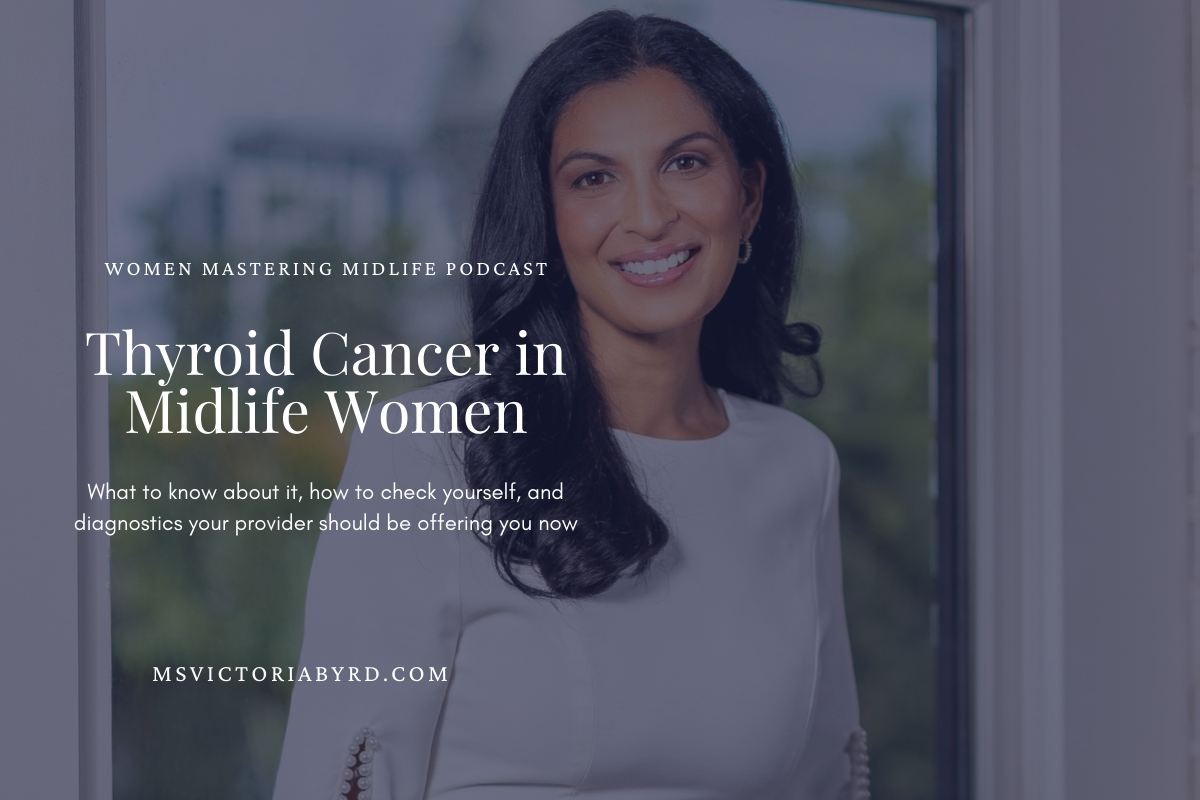The 2-Minute Neck Check Every Midlife Woman Should Know for Thyroid Health
Dr. Rashmi Roy joined me on this week’s podcast episode
The Thyroid’s Outsized Role in Midlife Health
When we think of midlife health, most of us focus on estrogen, progesterone, and the classic signs of perimenopause or menopause—hot flashes, sleep changes, and mood shifts. But there’s another hormone powerhouse that deserves equal attention: the thyroid.
This small, butterfly-shaped gland sits at the base of the neck and regulates energy, metabolism, weight, heart rate, hair, skin, and even mood. And yet, many thyroid symptoms overlap with menopause symptoms, making them easy to overlook.
Why Thyroid Cancer Awareness Matters
Thyroid cancer is the fifth most common cancer in women. Women are three times more likely than men to develop it, and the peak ages are 30–50—right in the midlife years.
What makes it especially tricky is that thyroid cancer rarely shows up in blood work. Even women with completely normal labs may still have nodules or cancer. That’s why physical checks and imaging are essential.
The Two-Minute Neck Check: A Simple Self-Exam
Dr. Rashmi Roy, one of the world’s leading thyroid surgeons, recommends a monthly “neck check.” Here’s how:
Stand in front of a mirror.
Place two fingers just above your collarbone at the center of your neck.
Gently move in circular motions upward toward your ears, checking for any unusual lumps or bumps.
Get familiar with what “normal” feels like so you can recognize changes.
Just like a breast self-exam, this quick routine builds awareness and helps with early detection.
Beyond Blood Tests: Ask for a Thyroid Ultrasound
Because thyroid cancer doesn’t always show up in routine labs, Dr. Roy encourages women to ask for a baseline thyroid ultrasound by age 30. If your thyroid is normal, you may only need a repeat every five years. If nodules are found, annual monitoring may be recommended.
Her own screening program found thyroid cancer in 2.4% of women with no history and no symptoms—a detection rate higher than mammograms and Pap smears. Early detection often means removing just half the thyroid, with many women not even needing long-term medication.
Hashimoto’s, Hypothyroidism, and Midlife
Thyroid cancer isn’t the only concern. Hashimoto’s thyroiditis, an autoimmune condition, is the most common cause of hypothyroidism (low thyroid function).
For most women, medication works well. But if symptoms persist despite treatment, surgery may restore quality of life. Dr. Roy notes that her Hashimoto’s patients are often among her most grateful because they finally feel like themselves again after surgery.
Lifestyle Support for Thyroid Health
While medical care is essential, lifestyle plays a powerful role in supporting thyroid health:
Gluten-free diet: especially beneficial for women with Hashimoto’s.
Anti-inflammatory eating: focus on whole, unprocessed foods.
Nutrient support: selenium and other key micronutrients can help.
Exercise and stress management: protect overall hormone balance.
Advocate for Your Health
The takeaway is simple but powerful: be your own advocate.
Don’t stop at “normal” labs—ask for a full thyroid panel.
Request a baseline ultrasound.
Add the neck check to your monthly routine.
Early detection turns a serious diagnosis into a manageable bump in the road.
Final Thoughts
Your thyroid may be small, but it impacts nearly every system in the body. By paying attention to this often-overlooked gland—especially during perimenopause and menopause—you can take charge of your health, catch problems early, and feel your best in midlife.
Ready to learn more? Listen to my full conversation with Dr. Rashmi Roy on the Women Mastering Midlife podcast.

